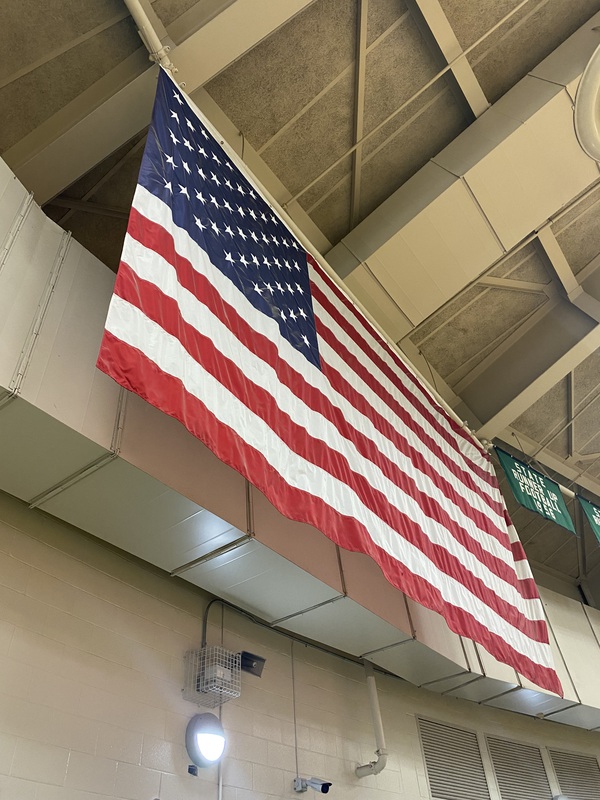Should Students Stand for the Pledge?
February 10, 2023
Standing for the pledge every morning has become a controversial topic in schools, especially here at Roswell.
Sports editor Emerson Keith spoke up about it and how she feels people need to act:
I pledge allegiance to the Flag of the United States of America…
Every weekday morning, to start off the school day, students, staff, and faculty stand up in their classrooms or offices to recite the Pledge of Allegiance towards the American Flag.
Political divisions have divided America within the last couple of years. Starting when the big pandemic, Covid-19 hit, different and divisive opinions about masks, vaccinations, and quarantining turned from simple topics into a lot of political dismemberment. This has leached onto some students not standing daily for the Pledge of Allegiance like they had in the past.
…and to the Republic for which it stands…
When we were just kids, we stood up with our right hand over our hearts facing the American flag in the classroom. Most kids didn’t really know exactly why they were doing it or what the importance of it was but everyone did it anyway. Everyone was told that they had to do it to show their respect and support for their country. Even with divisive political and social opinions, a person’s respect for their country should remain and be obvious.
As students grow older and mature, they tend to develop their own opinions concerning what is going on in the world and fortunately in our Democratic society, schools give students more freedom to express themselves and these opinions. This has led to many students starting clubs, organizations, or even movements to spread their voice. With this freedom, some students have chosen to sit down for the Pledge of Allegiance every morning to “make themselves heard.”
Most students who choose to stay sitting down for the pledge argue that it is because they “don’t like this country.” They tend to use their sexuality or political stance as an excuse, when, standing for the pledge isn’t about any of those things.
…one Nation under God, indivisible, with liberty and justice for all
In the pledge, we recite, “One nation, under God, indivisible, with liberty and justice for all.” By saying this, you are stating that we are all united under one nation, America, where we are unable to be separated and everyone will be treated fairly.
While some people may argue against these simple 31 words, there is so much more hidden behind them. In the pledge, we are pledging our allegiance not just to our country as a whole, but for the freedom we have and the people who fought for it. Many people get caught up in their own opinion and forget the real significance the pledge means. Soldiers have gone out there, into war, many not making it back home, to sacrifice their lives for this country and its freedom.
So when the announcement comes over the intercom every morning, and you get caught up in your own personal preferences or are just too tired to get out of your seat, think about the simple 30 words that you could say to pay your respect to the people who gave us our day-to-day freedom, as well as the freedom to even complain about the words in a pledge that have been around since 1892.
In an opposing point of view, staff writer Jennifer Lee writes about her viewpoint on the pledge:
Throughout one’s elementary and middle school life, seeing every single person in class stand for the pledge was the norm. Nowadays in Roswell’s classrooms, you may see a good number of students remain seated at 8:20 A.M. when someone recites the pledge on the announcements.
A choice that I find receives a ridiculous amount of flack.
It’s typical teenage milestone for high school students to begin changing their learned behavior from the elementary school years and begin to grow in critical thinking and awareness about their country.
Walk into any elementary or middle school as school begins and one will usually find every child stand to shift their body towards the American flag standing proudly near a wall. They are at least a little drowsy and have been reciting these words for almost as long as they can remember. Not out of patriotism, but because they have recited them almost every day during the school year without room for questions nor a full understanding of what they are saying.
However, when they become Roswell Hornets, they will gradually find that they do not necessarily need to stand for it. Although they might find some teachers and other students annoyed by this, they receive no punishment for not standing and reciting the pledge. This being due to the ruling of West Virginia State Board of Education v. Barnette, which confirmed that it would violate students’ First Amendment Rights to force them to salute the flag or say the pledge.
Students might not agree with the inclusion of the controversial “under God” phrase or perhaps they find the origins of Francis Bellamy’s revision of it odd, which according to the Smithsonian Magazine, was part of “The Youth’s Companion’s” promotion for the World’s Columbian Exposition commemorating Christopher Columbus’s landing in the Americas 400 years earlier. It may feel questionable for some people to say it every day in school when it was originally a marketing ploy to sell American flags and magazine subscriptions in its creation.
They could also possibly feel that the U.S. does not actually stand for the principles listed in it, a whole other can of worms that can be opened at another time.
Then again, it is equally possible that they aren’t thinking through this that seriously and are just tired in the morning.
Nevertheless, the line of reasoning is irrelevant when public school students have every right to remain seated during the pledge. Since free speech also includes the right to refrain from speaking against your beliefs, the U.S. Supreme Court declared in 1943 that mandating all public-school students to recite the pledge of allegiance was a violation of their First Amendment rights.
With this decrease, you will find many outcries of it being “disrespectful” or “offensive” to not participate in this daily display of patriotism. A core argument is that any reason for not standing and reciting the pledge relating to the U.S. government and current events is invalid due to it not being for the government but a promise of solidarity with the American people.
However, many minorities may find themselves in a complicated relationship with this concept of American unity in its current state. It is a tall order to expect them to show unconditional love for a country that continues to mistreat them for their identities. One example of this being Texas’s frequent targeting of LGBTQ+ individuals, especially trans people in its attempts to launch child abuse investigations on parents who provide gender-affirming care to their children. It is not even as if America’s problems stem strictly from government officials. America is said to be a melting pot, but those part of a racial minority may often find themselves discriminated against for aspects of themselves they cannot alter.
There is a lot of frustration towards the United States as a whole because of this and one way of quietly expressing this is refusing to stand for the pledge of a country that often disrespects them.
Personally, I returned to face-to-face learning with a lot of tricky feelings to reflect on regarding my identity as an Asian-American. For the past year and a half, it was dizzying to watch people, who had likely repeated the phrase “With Liberty and Justice for all” from memory throughout their school days, harass and even enact hate crimes against their fellow Americans who just happened to look like me. To be exact, hate crimes committed against Asian-Americans increased by 77% between 2019 and 2020, according to the Federal Bureau of Investigation (FBI). Additionally, more than 9,000 anti-Asian hate incidents were self-reported to the group Stop AAPI Hate between March 2020 and June 2021.
As I noticed that there were people sitting as I stood on instinct for the pledge, I realized that I had the freedom to grapple with my connection to the U.S. and its people my own way. Of course, I am grateful to be here, but it was uncomfortable to continue standing and reciting values that have often felt like they’ve been proven false.
At the end of the day, the choice belongs to the student. I am not judgmental towards those who still stand for it as it is their right to make that decision, just like it is for any other student who decides not to for whatever reason. This argument will be persistent in the years to come and all I ask is for people to not be so narrow-minded on the matter.
After all, no matter how much scrutiny one can throw at those who don’t stand, they still have every right not to do so at the end of the day.



